Gust’s Atelier series has been around for two decades now, with about one new game per year added to the series. This year received two new games, the underwhelming Atelier Nelke and the return of the Arland series, Atelier Lulua: The Scion of Arland.
After so many years and games, the series is bound to be getting old, right? Why bother reviving the first modern Atelier cycle? Well, there’s a pretty good reason.
Atelier Lulua might not be a huge leap forward for the series, but it combines the best elements from previous Atelier games to make this new entry a contender for best of the crop and an excellent starting point for newbies.
The Quest to Be the Best
Atelier Lulua‘s basic beats are closely similar to pretty much every other Atelier game since the PS2 days. The main character — Elmerulia Frixell, aka Lulua — is an apprentice alchemist who wants to improve her skills and takes on a variety of tasks to do so.
To get to that end point, the plot structure borrows some from the Arland and Dusk trilogies to make its own unique setup. Each chapter has its own focus, whether it’s crafting a certain item, helping fend off monster invasions or — in a nice nod to the first Arland game — working yet again to keep the government from closing Rorona’s atelier.
There are several sub-goals in every chapter as well, most of which revolve around finding new items and learning new recipes. These recipes typically unlock important items Lulua can use to further explore the world or gain new materials — or both.
Lulua gets important sub-quests in the Alchemyriddle, a special book that falls onto Lulua’s head early in the game and acts as a sort of alchemy guide. There are some riddles, hence the name, with hints for places to go or items to collect, and upon fulfilling these requirements, Lulua can decipher the book’s meaning and unlock a new recipe.
As the designation of “sub-goal” suggests, you don’t have to complete these if you don’t want to. It’s a good idea, though, both to help raise your Alchemy Level and because the items are always useful.
Like the Dusk games, Lulua also has an overarching plot that isn’t directly related to the main character’s quest to become an alchemist. Alongside the mysterious ruins next to Lulua’s hometown of Arklys that no one can figure out how to fully explore (but, as you’d expect, is very, very important), there’s a strange bird connected to judgement and salvation that makes a recurring visit every time something important happens to Lulua.
Oh, and an equally strange child who knows way too much about said bird and doesn’t act very childlike; as with many JRPGs, and anime in general, her special hair (mutli-color) gives you a good idea she’s an important character from the get-go.
Familiar Faces
Lulua comes across a variety of characters in her journeys that help out in one form or another, either by joining her party or acting in a support role of some kind. A big draw for series fans is the return of many familiar characters from previous Arland games, including the three main alchemists — Rorona, Totori, and Meruru — along with several others, such as Piana from Totori, Keina from Meruru,and Sterk from Rorona.
A common issue in modern Atelier games is the lack of real character development or interesting characters in general; most fall easily into a well-established trope or five.
Lulua isn’t much different in this regard. You’ve got the bubbly, determined girl (Lulua) the quiet one with hidden depths (Eva), the stern young swordsman (Aurel), and the experienced teacher (Piana), among many others.
Silly gags abound, the goddess-like tavern keeper binge eats when no one is looking, and of course, Lulua deals with insecurities arising from her youth and bumbling nature.
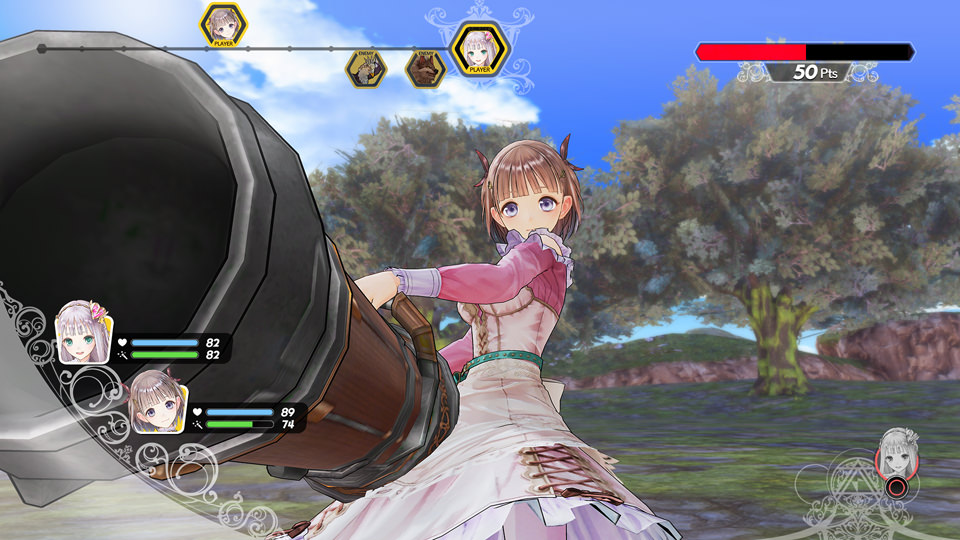 Eva’s hidden depths take the form of this giant cannon
Eva’s hidden depths take the form of this giant cannon
The issue is that many of these types are present in other Arland games as well. It’s difficult to criticize too much, though. The writing is so earnest — if shallow and of dubious localization quality at times — and the characters fit their roles so well, everything ends up flowing naturally anyway.
Using well-worn tropes complement the series’s appeal, as well as Lulua‘s. There’s a definite sense that the games are meant as a kind of comfort food, and the predictable and recognizable fit perfectly with that.
That’s not to say characters don’t develop at all. The story takes some interesting twists later on, including certain characters’ relationships to each other and the potential for future Arland games to continue building on some of the elements introduced in Lulua.
Important narration comes in the form of black and white flashback-type scenes where an older Lulua reflects on how certain events changed her or were significant, typically at the end of each chapter.
They offer a subtle, but interesting, bit of character development, which stands out since big changes don’t often happen. Normally, almost every sentence Lulua utters ends in an exclamation point, but when looking back Lulua speaks in a calmer, more measured tone.
Goofy as the writing might be at many points, there’s a level of self-aware humor that’s difficult to resist.
For example, after the Alchemyriddle materializes from nowhere and hits Lulua on the head, she acknowledges it, but then runs off, ready for her next meal. Aurel later comments about how perhaps she should consider the merits of trusting a book only she can see that fell out of the sky.
These are just a few instances where the game is capable of recognizing its more outrageous points and joins in the fun of poking at them.
As is common with the series, Lulua includes several slice-of-life components, such as specific character events that unlock at a given point. Unlike previous entries, including Rorona, it’s a lot easier to figure out when and where these are because the quick travel map adds a star mark to places with events.
Some characters don’t make a return, like Astrid. Her snark and general presence might be easy to miss. However, it means the Arland games no longer have that slightly creepy element, making it easier to recommend on whole.
Take Your Time — Or Not
One other important thing to note is that while Lulua does include a calendar, it doesn’t have hard time limits like the other Arland games. Fortunately, the overall structure helps Lulua overcome an issue that plagued some later games in the series that also did away with the time limit mechanic: The lack of anything to push you forward.
There’s always something to do, whether you’re trying to move the story forward, unlock new items, or are simply taking time to complete the never-ending barrage of sidequests available in each major location. It does mean the element of weighing decisions to find the best option for moving forward is gone, which might not please longtime fans.
However, it makes the game an excellent entry point for the series and helps make it a relaxing way to spend time overall. The inclusion of a more in-depth story, by series standards, helps make this one of the better Arland games as well, if you’re looking for more of a traditional RPG.
Synthesize Me, Cap’n
The heart of most Atelier games is in the alchemy, and Lulua doesn’t disappoint here. It eschews the placement-based mechanics of the Mysterious trilogy and goes back to the Arland roots by emphasizing item quality and characteristics instead.
The basics will be very familiar to anyone who played Rorona or the other Arland games, but Lulua does include some extra functions during synthesis.
Each item has an elemental quality, and pairing them up for the finished product or focusing on specific qualities potentially unlocks an extra, awakened quality for that item. These are in addition to any other included effects, like extra damage or causing a burn.
It’s a system that seems shallow on the surface, but quickly becomes addictive. That’s ultimately a bonus, because you’ll be doing a lot of synthesis. The majority of sidequests involve creating a certain number or quality of items, main quests involve crafting items, progressing forward in general means you — surprise! — have to craft items.
Luckily, item gathering and synthesis form an incredibly addictive and satisfying gameplay loop.
There’s no shortage of areas to gather items from in Atelier Lulua either. In fact, you can pretty much gather items anywhere; even towns have some spots Lulua can raid for synthesis materials. Synthesis requires a cauldron, though, so Lulua has to go back to her mobile atelier to make something, which is okay, given the initial cap on how many items fit in the basket.
Gathering can be as quick and focused as you want, or you can drag it out into a lengthy exploration journey searching for hidden treasures and monsters, so long as you’ve got room in said basket.
It’s just another way the game lets you shape how you experience it, and the same goes for the actual synthesis.
Each item you craft has a specific type, and sometimes quality, requirement, but you’re completely free to experiment with different quality levels and attributes to suit your needs — or just for the heck of it. Ultimately, there are countless ways to make the same item.
Fight! Well, If You Want…
Combat is equally customizable. Most Atelier games, with the exception of Iris and Escha & Logy, don’t make combat a central feature outside of boss fights, monster hunting requests, and getting certain materials as item drops. Since the emphasis is always on crafting, monster fights are sort of just a necessary bump in the road, to be dealt with quickly so you can move on.
In other words, it’s very easy. It’s even easier once you get support members in your combat party, which happens very early. You can’t control support members directly, but they have special skills that activate under certain conditions — for instance, using a specific combat member’s skill attack. These support attacks add substantially to the damage dealt and make battles even easier.
It’s a bit disappointing, actually. You end up with so many different skills and synthesized items you can use in battle that the lack of big challenge makes it seem a like a missed opportunity. Of course, this isn’t unique to Lulua, but it would be nice to eventually make use of the combat variety outside of endgame and DLC maps.
Still, cranking the difficulty up does at least make fights last longer, and since characters’ HP doesn’t rise rapidly as they level up, extended fights wear your party down more.
A World Worth Exploring
Atelier Lulua might not take full advantage of the PS4’s capabilities, but it’s certainly a lovely looking game, arguably the best in the series so far. Each environment is vibrant and bursting with color, even more so than the Mysterious trilogy.
That’s definitely a good thing, since you spend so much time in them gathering materials, and the simple, yet colorful designs fit with the overall gameplay style to make Lulua a pleasant change from other, more intense games (should you so desire such a change).
There’s a surprising amount of detail for such simple environments too, so each feels completely distinct and actually invites exploration. It’s a good step up from the open world experiments of some Mysterious games and the rather bland corridors from the earlier Arland games.
Lulua‘s soundtrack is similar to other Atelier games, but that’s not a bad thing. It’s full of bright and bubbly tracks to complement each area, and the Atelier Wagon theme is a fun one with some melodic and stylistic throwbacks to Rorona’s atelier theme.
A huge portion of the game is fully voiced as well, though the voice track is Japanese only. The feat is impressive, since even shopkeepers’ lines are voiced. However, your enjoyment of it depends on your tolerance for the distinctly Japanese style.
The consistently high vocal pitch and over-exaggeration isn’t uncommon for anime and Japanese games in general, but it does get old quickly for many, this writer included.
—
Pros
- Simple, yet addictive and expansive synthesis system
- Highly customizable experience
- Good use of returning characters to create a more interesting plot
- Excellent chill-out game
Cons
- Well-used tropes might not please everyone
- Definite gap between combat options and difficulty
- Ultimately doesn’t innovate much
Game of the year material, Atelier Lulua is not. However, it does what it sets out to do very well, and criticizing a lack of innovation is difficult because of that. Hopefully, future Atelier games change things up even more, but either way, Atelier Lulua is easily the best Arland game and one of the better, if not best, Atelier experiences in general.
[Note: Koei Tecmo provided a copy of Atelier Lulua for the purposes of this review.]

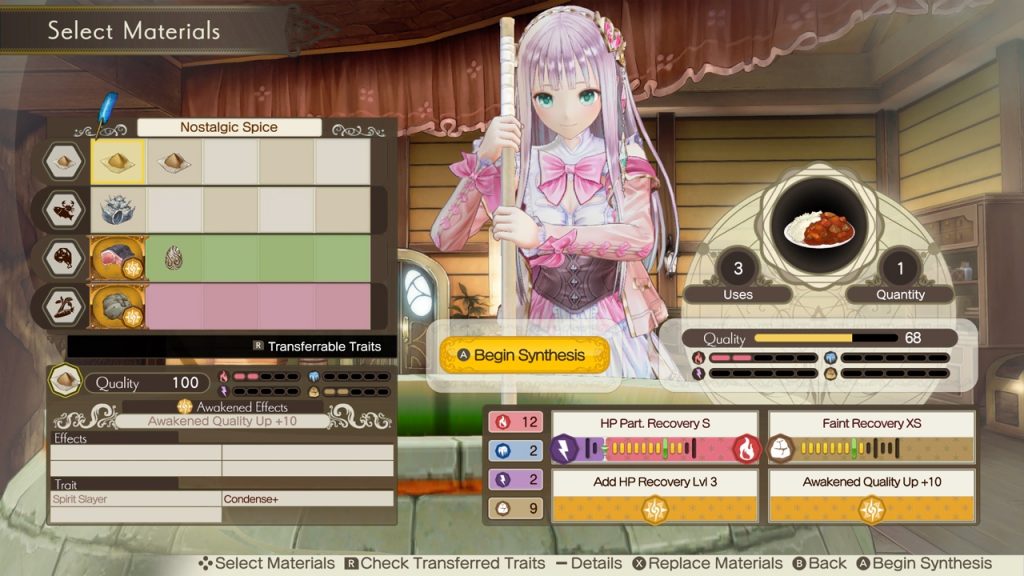
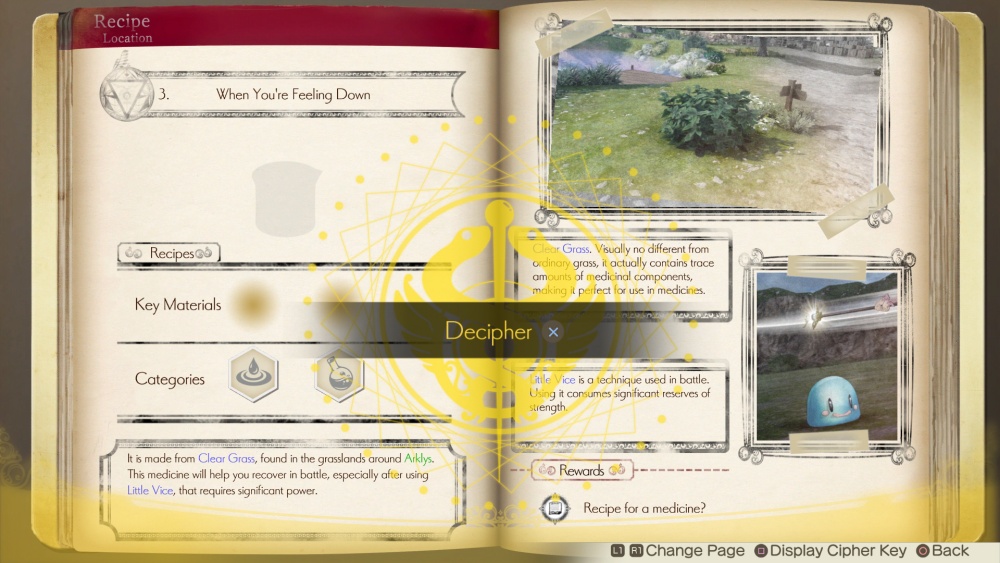
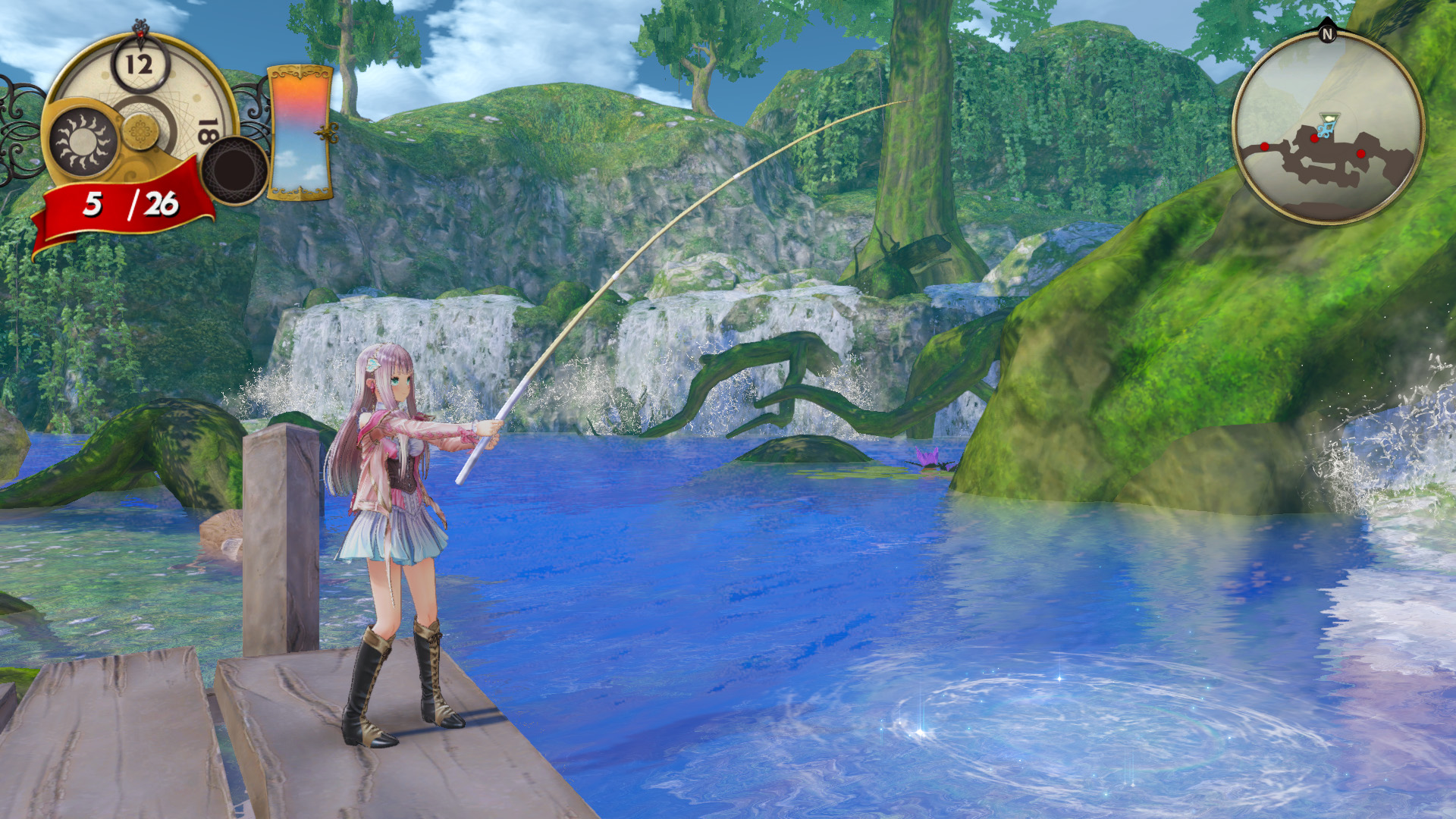
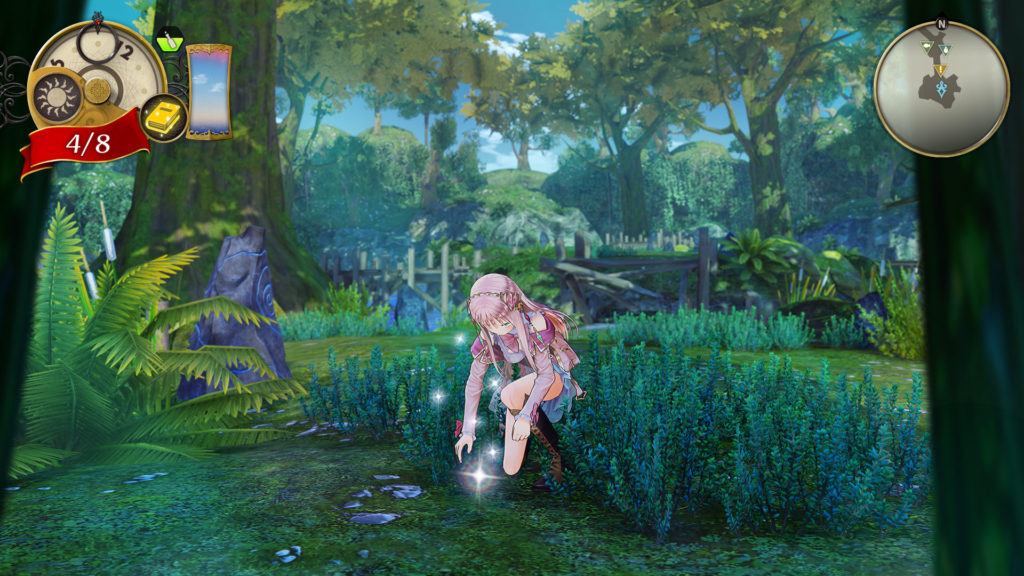
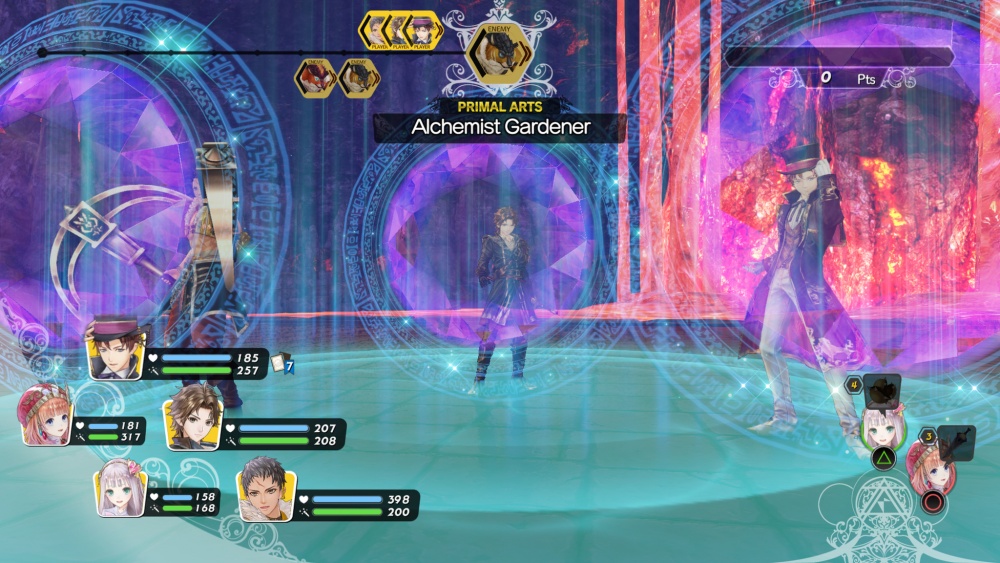





Published: May 24, 2019 02:08 pm